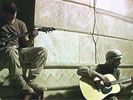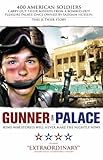Eye For Film >> Movies >> Gunner Palace (2004) Film Review
Available as a bootleg DVD on the streets of Iraq now.
I met director and ex-soldier Michael Tucker just before the screening of his documentary about post-war, minor-conflict Iraq. He looked very sombre and said American audiences tend to look at the reporting as entertainment. For somebody who has followed the coverage quite avidly, with the advantage of British and international media access, rather than the more one-sided American broadcasts, I assured him I was very interested to see what his film had to say. Disappointingly, I didn't feel this was very much.

Tucker has known 10 people who have been killed in Iraq since he worked with them out there. That is no small burden to be carrying. Sadly, I neither knew them, nor do I see any similarity between the US troops in the film and British soldiers that would enable me to empathise to any great degree. With a couple of exceptions, the young Americans in the film are not the best of advertisements for their country, reminding me of the kind of youths who hang around on street corners, that don't take anything too seriously, yet have been give a wage and taught to use a gun.
One female soldier and a bespectacled young man seem fairly articulate, but the others take up too much time with inane jokes, playing guitar and rapping. This might be understandable as a way of letting off steam, when faced with daily dangers that most of us cannot even imagine, but it paints an uninviting picture of the individuals; as liberators, they are far from role models. If the army does them some good, which might be debateable, that does not excuse the impression they create worldwide, of loud-mouthed youths that have little interest, or understanding, of others. When I tackled Tucker about this, he pointed out that the average age of American troops is quite young - about 20 - as opposed to their British counterparts, who are older and more mature.
Gunner Palace is the name given to one of Saddam's former palaces, now occupied by US troops and used for general partying. I searched in vain for something that would add to the arguments about the rights and wrongs of the invasion. Tucker said that the general American feeling he encountered was that people supported the troops, even if they didn't support the war. When I asked how this differed from his view, he said his view kept changing, then he admitted he felt America had bitten off more than it could chew. To him, the "rights and wrongs" were "obvious."
Even with a Masters Degree in ethics, I don't find the rights and wrongs of such a complex situation "obvious". I have many American friends, so know that the ones portrayed in this film are not entirely representative. According to international studies, they bolster the image Americans have abroad of being noisy bullies.
I pressed Tucker on whether there was an over-riding reason why he had chosen to make such a movie (I could think of a number - one might be as a tribute to the soldiers killed and a memorial their families could keep). He said he felt the media didn't cover what being an ordinary soldier in Iraq meant. That's a pretty decent reason and I support his objective in wanting to document it. Gunner Palace does show the day-to-day life of the squaddies, although it could have been condensed to 15 minutes, instead of 85. It becomes boring and monotonous, with too much rap, elaborate praise of McDonalds and Snapple and kids joking about.
Ultimately, the film fails to show the deeper ways these youngsters will have been affected. How far it succeeds in its stated objective is for history to decide and, in the event that history can be bothered, it is to be hoped that there will be more substantial background detail than Mr Tucker's film provides. Seeing as both Americans and Iraqis have lost so much in the war, it is good that responses to the film from those countries have been appreciative.
Tucker mentioned that before he left Iraq he discovered bootleg copies of his movie freely available on the streets outside Gunner Palace - a place ordinary Iraqis have never seen inside.
Reviewed on: 23 Aug 2005

















